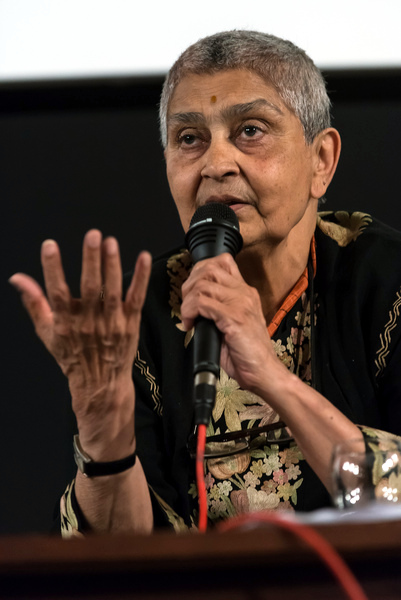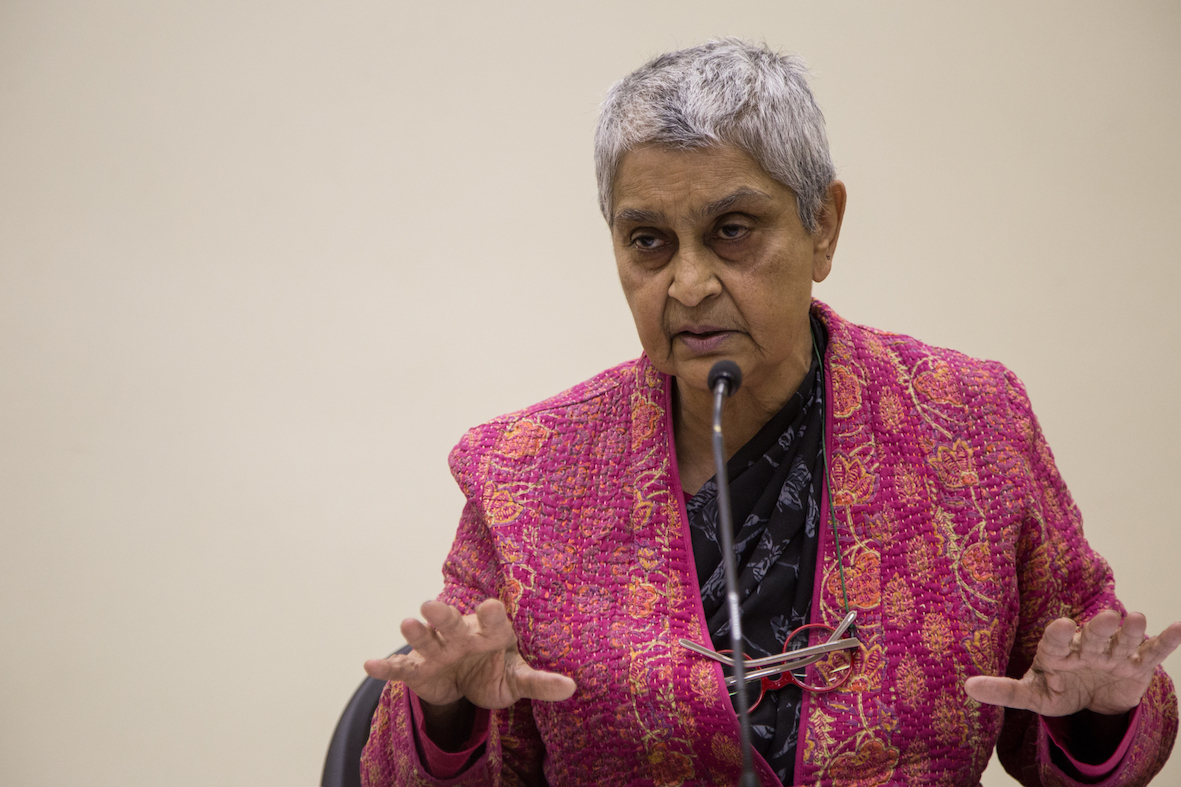
池田光穂(oxlajuuj tijaax)
17.0 ★スピバックさんとは、どんな人か?
☆ガヤトリ・チャクラヴォルティ・スピヴァク(IPA: gaĕòttri
t͡ʃɔkkròbòr(t)ti)FBA(1942年2月24日生まれ)は、インドの学者、文学理論家、フェミニズム批評家である。[1]
彼女はコロンビア大学の特別教授であり、同大学の比較文学・文化研究所の創設メンバーでもある。[2]
最も影響力のあるポストコロニアルの知識人の一人と考えられているスピヴァクは、エッセイ「サバルタンは語ることができるか?」とジャック・デリダ著『グ
ラマトロジーについて』の翻訳と序文で最もよく知られている。[3][4]
また、マハシュヴェタ・デヴィの多くの作品を英語に翻訳しており、デヴィの人生と文体に関する個別の評論注釈を付けている。特に『イマジナリー・マップ』
や『ブレスト・ストーリーズ』などがある。
スピヴァクは、「グローバル化された世界における知的植民地主義に反対する人文科学の代弁者である批判理論家および教育者」として、2012年の京都賞
(思想・芸術部門)を受賞した。[5][6][7]
2013年には、インド共和国から与えられる民間人向け賞としては3番目に高いパドマ・ブーシャン賞を受賞した。[8]
ポストコロニアリズムと関連付けられているものの、スピヴァクは著書『ポストコロニアリズム理性批判』(1999
年)で、その学問分野から自らを切り離していることを確認している。この立場は、彼女が2021年に『Janus Unbound: Journal
of Critical
Studies』誌に発表した「ポストコロニアリズム研究の遺産が今日のコロニアリズムをどう考えるか」と題するエッセイでも維持されている。[9]
| Gayatri
Chakravorty Spivak (IPA:
gaĕòttri t͡ʃɔkkròbòr(t)ti) FBA (born 24 February 1942) is an Indian
scholar, literary theorist, and feminist critic.[1] She is a University
Professor at Columbia University and a founding member of the
establishment's Institute for Comparative Literature and Society.[2] Considered one of the most influential postcolonial intellectuals, Spivak is best known for her essay "Can the Subaltern Speak?" and her translation of and introduction to Jacques Derrida's De la grammatologie.[3][4] She has also translated many works of Mahasweta Devi into English, with separate critical notes on Devi's life and writing style, notably Imaginary Maps and Breast Stories. Spivak was awarded the 2012 Kyoto Prize in Arts and Philosophy for being "a critical theorist and educator speaking for the humanities against intellectual colonialism in relation to the globalized world."[5][6][7] In 2013, she received the Padma Bhushan, the third highest civilian award given by the Republic of India.[8] Although associated with postcolonialism, Spivak confirmed her separation from the discipline in her book A Critique of Postcolonial Reason (1999), a position she maintains in a 2021 essay titled "How the Heritage of Postcolonial Studies Thinks Colonialism Today", published by Janus Unbound: Journal of Critical Studies.[9] |
ガヤトリ・チャクラヴォルティ・スピヴァク(IPA:
gaĕòttri
t͡ʃɔkkròbòr(t)ti)FBA(1942年2月24日生まれ)は、インドの学者、文学理論家、フェミニズム批評家である。[1]
彼女はコロンビア大学の特別教授であり、同大学の比較文学・文化研究所の創設メンバーでもある。[2] 最も影響力のあるポストコロニアルの知識人の一人と考えられているスピヴァクは、エッセイ「サバルタンは語ることができるか?」とジャック・デリダ著『グ ラマトロジーについて』の翻訳と序文で最もよく知られている。[3][4] また、マハシュヴェタ・デヴィの多くの作品を英語に翻訳しており、デヴィの人生と文体に関する個別の評論注釈を付けている。特に『イマジナリー・マップ』 や『ブレスト・ストーリーズ』などがある。 スピヴァクは、「グローバル化された世界における知的植民地主義に反対する人文科学の代弁者である批判理論家および教育者」として、2012年の京都賞 (思想・芸術部門)を受賞した。[5][6][7] 2013年には、インド共和国から与えられる民間人向け賞としては3番目に高いパドマ・ブーシャン賞を受賞した。[8] ポストコロニアリズムと関連付けられているものの、スピヴァクは著書『ポストコロニアリズム理性批判』(1999年)で、その学問分野から自らを切り 離していることを確認している。この立場は、彼女が2021年に『Janus Unbound: Journal of Critical Studies』誌に発表した「ポストコロニアリズム研究の遺産が今日のコロニアリズムをどう考えるか」と題するエッセイでも維持されている。[9] |
| Life Early life Spivak was born Gayatri Chakravorty in Calcutta, India, to Pares Chandra and Sivani Chakravorty.[10] After completing her secondary education at St. John's Diocesan Girls' Higher Secondary School, Spivak attended Presidency College, Kolkata under the University of Calcutta, from which she graduated in 1959.[10] Spivak has been married twice—first to Talbot Spivak, from 1964 to 1977, and then to Basudev Chatterji.[11] She has no children.[11] 1960s and 1970s In 1959, upon graduation, she secured employment as an English tutor for forty hours a week. Her MA thesis was on the representation of innocence in Wordsworth with M.H. Abrams. In 1961, Spivak joined the graduate program in English at Cornell University in the United States, traveling on money borrowed on a so-called "life mortgage". In 1962, unable to secure financial aid from the department of English, she transferred to a new program called Comparative Literature, although she had insufficient preparation in French and German. Her dissertation was under the guidance of the program's first director, Paul de Man, titled Myself Must I Remake: The Life and Poetry of W.B. Yeats.[10] In 1963–1964, she attended Girton College, Cambridge, as a research student under the supervision of Professor T.R. Henn, writing on the representation of the stages of development of the lyric subject in the poetry of Yeats. She presented a course in the summer of 1963 on "Yeats and the Theme of Death" at the Yeats Summer School in Sligo, Ireland. (She returned there in 1987 to present Yeats' position within post-coloniality.)[citation needed] In the Fall of 1965, Spivak became an assistant professor in the English department of the University of Iowa. She received tenure in 1970. She did not publish her doctoral dissertation, but decided to write a critical book on Yeats that would be accessible to her undergraduate students without compromising her intellectual positions. The result was her first book, written for young adults, Myself I Must Remake: The Life and Poetry of W.B. Yeats.[12] In 1967, on her regular attempts at self-improvement, Spivak purchased a book, by an author unknown to her, entitled De la grammatologie. She decided to translate this book, and wrote a long translator's preface. This publication was immediately a success, and the "Translator's Preface" began to be used around the world as an introduction to the philosophy of deconstruction launched by the author, Jacques Derrida, whom Spivak met in 1971.[13] In 1974, at the University of Iowa, Spivak founded the MFA in Translation in the department of Comparative Literature.[14] The following year, she became the Director of the Program in Comparative Literature and was promoted to a full professorship. In 1978, she was National Humanities Professor at the University of Chicago. She received many subsequent residential visiting professorships and fellowships. In 1978, she joined the University of Texas at Austin as professor of English and Comparative Literature. 1980s to present In 1982, she was appointed as the Longstreet Professor in English and Comparative Literature at Emory University. In 1986, at the University of Pittsburgh, she became the first Mellon Professor of English. Here, she established the Cultural Studies program. From 1991, she was a member of faculty at Columbia University as Avalon Foundation Professor in the Humanities, where, in 2007, she was made University Professor in the Humanities. Since 1986, Spivak has been engaged in teaching and training adults and children among the landless illiterates on the border of West Bengal and Bihar/Jharkhand. This sustained attempt to access the epistemologies damaged by the millennial oppression of the caste system has allowed her to understand the situation of globality as well as the limits of high theory more clearly. In 1997, her friend Lore Metzger, a survivor of the Third Reich, left her $10,000 in her will, to help with the work of rural education. With this, Spivak established the Pares Chandra and Sivani Chakravorty Memorial Foundation for Rural Education; to which she contributed the majority of her Kyoto Prize. |
生涯 幼少期 スピヴァクは、インドのカルカッタで、パレシュ・チャンドラとシヴァニ・チャクラボルティーの間に、ガヤトリ・チャクラボルティーとして生まれた。 [10] セント・ジョーンズ教区女子高等学校で中等教育を修了した後、スピヴァクはカルカッタ大学の下部組織であるプレジデンシー・カレッジ・コルカタに入学し、 1959年に卒業した。[10] スピヴァクは2度結婚しており、最初は1964年から1977年までタルボット・スピヴァクと、次にバースデヴ・チャタジーと結婚した。[11] 彼女には子供はいない。[11] 1960年代と1970年代 1959年、卒業と同時に週40時間、英語の家庭教師として職を得た。修士論文のテーマは、M.H.アブラムズとの共著で、ワーズワースにおける無垢の表 現についてであった。1961年、スピヴァクは「生活担保」で借りたお金でアメリカのコルネル大学の英語学大学院に入学した。1962年、英語学科から経 済的支援を得ることができなかったため、フランス語とドイツ語の準備が不十分であったにもかかわらず、比較文学という新しいプログラムに転校した。彼女の 博士論文は、比較文学プログラムの初代ディレクターであるポール・ド・マンの指導の下で執筆され、タイトルは『Myself Must I Remake: The Life and Poetry of W.B. Yeats』であった。1963年から1964年にかけて、彼女はケンブリッジ大学のギルトン・カレッジで研究生としてT.R.ヘン教授の指導を受け、 イェーツの詩における叙事的主体の成長段階の表現について研究した。1963年夏には、アイルランドのスライゴで開催されたイェーツ・サマースクールで 「イェーツと死のテーマ」という講座を担当した。(1987年には再び同地を訪れ、ポストコロニアリズムにおけるイェーツの位置づけについて発表してい る。)[要出典] 1965年秋、スピヴァクはアイオワ大学英語学部の助教授となった。1970年に終身在職権を得た。彼女は博士論文を公表することはなかったが、自身の知 的立場を妥協することなく、学部学生にも理解できるようなイェーツに関する評論を書くことを決意した。その結果が、彼女の最初の著書であり、若い大人向け に書かれた『Myself I Must Remake: The Life and Poetry of W.B. Yeats』である。 1967年、自己改善を試みる中で、スピヴァクは、著者不明の『De la grammatologie』という本を入手した。彼女はこの本を翻訳することを決意し、長い訳者序文を書いた。この本はたちまち成功を収め、この「訳者 序文」は、著者のジャック・デリダが打ち出した脱構築の哲学の入門書として、1971年にスピヴァクが彼と出会って以来、世界中で使用されるようになっ た。 1974年、アイオワ大学でスピヴァクは比較文学科に翻訳修士課程(MFA in Translation)を創設した。[14] 翌年、彼女は比較文学科の学科長となり、正教授に昇進した。1978年、彼女はシカゴ大学の全米人文科学教授となった。その後も、多くの客員教授職やフェ ローシップを授与された。1978年にはテキサス大学オースティン校の英米文学および比較文学の教授に就任した。 1980年代から現在まで 1982年にはエモリー大学で英文学および比較文学のロングストリート教授に任命された。1986年にはピッツバーグ大学で初のメロン英文学教授に就任 し、ここでカルチュラル・スタディーズのプログラムを立ち上げた。1991年からはコロンビア大学で人文科学のアバロン財団教授を務め、2007年には人 文科学のユニバーシティ・プロフェッサーに任命された。 1986年より、スピヴァクは西ベンガル州とビハール州/ジャールカンド州の州境に住む土地を持たない文盲の人々、大人や子供たちに教育やトレーニングを 行っている。こうした千年にわたるカースト制度の抑圧によって傷ついた認識論へのアクセスを試みる継続的な取り組みにより、彼女はグローバリゼーションの 状況とハイ・セオリーの限界をより明確に理解することができた。1997年には、第三帝国の生き残りである友人ロア・メッツガーが、農村教育の活動支援の ために遺言で1万ドルを彼女に残した。これを受けてスピヴァクは、農村教育のためのパレシュ・チャンドラ・シヴァーニ・チャクラヴォルティー記念財団を設 立した。この財団には、彼女が京都賞の大半を寄付した。 |
| Work Gayatri Spivak  Spivak speaking on “The Strength of Critique: Trajectories of Marxism–Feminism” at the Internationaler Kongress Spivak rose to prominence with her translation of Derrida's De la grammatologie, which included a translator's introduction that has been described as "setting a new standard for self-reflexivity in prefaces".[15] After this, as a member of the "Subaltern Studies Collective", she carried out a series of historical studies and literary critiques of imperialism and international feminism. She has often referred to herself as a "practical Marxist-feminist-deconstructionist".[16] Her predominant ethico-political concern has been for the space occupied by the subaltern, especially subaltern women, both in discursive practices and in institutions of Western cultures. Edward Said wrote of Spivak's work, "She pioneered the study in literary theory of non-Western women and produced one of the earliest and most coherent accounts of that role available to us."[17] "Can the Subaltern Speak?" Her essay, "Can the Subaltern Speak?" (1988), established Spivak among the ranks of feminists who consider history, geography, and class when thinking about women. In "Can the Subaltern Speak?", Spivak discusses the lack of an account of the Sati practice, leading her to reflect on whether the subaltern can even speak.[18] Spivak writes about the process, the focus on the Eurocentric Subject as they disavow the problem of representation; and by invoking the Subject of Europe, these intellectuals constitute the subaltern 'Other of Europe' as anonymous and mute. In all her work, Spivak's main effort has been to try to find ways of accessing the subjectivity of those who are being investigated. She is hailed[by whom?] as a critic who has feminized and globalized the philosophy of deconstruction, considering the position of the subaltern (a word used by Antonio Gramsci as describing ungeneralizable fringe groups of society who lack access to citizenship). In the early 1980s, she was also hailed as a co-founder of postcolonial theory, which she refused to accept fully. Her A Critique of Postcolonial Reason, published in 1999, explores how major works of European metaphysics (e.g., Kant, Hegel) not only tend to exclude the subaltern from their discussions, but actively prevent non-Europeans from occupying positions as fully human subjects.[19] In this work, Spivak launched the concept of "sanctioned ignorance" for the "reproducing and foreclosing of colonialist structures". This concept denotes a purposeful silencing through the "dismissing of a particular context as being irrelevant"; an institutionalized and ideological way of presenting the world.[20] Spivak coined the term "strategic essentialism", which refers to a sort of temporary solidarity for the purpose of social action. For example, women's groups have many different agendas that potentially make it difficult for feminists to work together for common causes. "Strategic essentialism" allows for disparate groups to accept temporarily an "essentialist" position that enables them able to act cohesively and "can be powerfully displacing and disruptive."[21] However, while others have built upon the idea of "strategic essentialism", Spivak has been unhappy with the ways the concept has been taken up and used. In interviews, she has disavowed the term, although she has not completely deserted the concept itself.[22][23] In speeches given and published since 2002, Spivak has addressed the issue of terrorism and suicide bombings. With the aim of bringing an end to suicide bombings, she has explored and "tried to imagine what message [such acts] might contain", ruminating that "suicidal resistance is a message inscribed in the body when no other means will get through".[24] One critic has suggested that this sort of stylised language may serve to blur important moral issues relating to terrorism.[25] However, Spivak stated in the same speech that "single coerced yet willed suicidal 'terror' is in excess of the destruction of dynastic temples and the violation of women, tenacious and powerfully residual. It has not the banality of evil. It is informed by the stupidity of belief taken to extreme."[24] Apart from Derrida, Spivak has also translated the fiction of the Bengali author, Mahasweta Devi, the poetry of the 18-century Bengali poet Ramprasad Sen, and A Season in the Congo by Aimé Césaire, a poet, essayist, and statesman from Martinique. In 1997, she received a prize for translation into English from the Sahitya Akadami from the National Academy of Literature in India.[26] Academic roles and honors She has been a Guggenheim fellow, has received numerous academic honours including an honorary doctorate from Oberlin College,[27] and has been on the editorial board of academic journals such as Boundary 2. She was elected to the American Philosophical Society in 2007.[28] In March of that same year, Columbia University President Lee Bollinger appointed Spivak University Professor, the institution's highest faculty rank. In a letter to the faculty, he wrote: Not only does her world-renowned scholarship—grounded in deconstructivist literary theory—range widely from critiques of post-colonial discourse to feminism, Marxism, and globalization; her lifelong search for fresh insights and understanding has transcended the traditional boundaries of discipline while retaining the fire for new knowledge that is the hallmark of a great intellect. Spivak has served on the advisory board of numerous academic journals, including Janus Unbound: Journal of Critical Studies published by Memorial University of Newfoundland, differences, Signs: Journal of Women in Culture and Society, Interventions: International Journal of Postcolonial Studies published by Routledge, and Diaspora: A Journal of Transnational Studies.[29][30][31] Spivak has received 11 honorary doctorates from the University of Toronto, University of London, Oberlin College, Universitat Rovira Virgili, Rabindra Bharati University, Universidad Nacional de San Martín, University of St Andrews, Université de Vincennes à Saint-Denis, Presidency University, Yale University, and University of Ghana-Legon. In 2012, she became the only Indian recipient of the Kyoto Prize in Arts and Philosophy in the category of Arts and Philosophy, while in 2021 she was elected a corresponding fellow of the British Academy.[32] Spivak has advised many significant post-colonial scholars. Professors Jenny Sharpe and Mark Sanders are among her former students.[19]: xxiii [33] |
仕事 ガヤトリ・スピヴァク  スピヴァクは「批判の力:マルクス主義フェミニズムの軌跡」について、インターナショナル・コングレスで講演した スピヴァクは、デリダの『グラマトロジーについて』の翻訳で一躍有名になった。この翻訳には「序文における自己言及性の新たな基準を打ち立てた」と評され る翻訳者による序文が含まれていた。[15] その後、「サバルタン研究集団」のメンバーとして、帝国主義と国際フェミニズムに関する一連の歴史研究と文学批評を行った。彼女はしばしば自らを「実践的 マルクス主義フェミニスト・脱構築主義者」と称している。[16] 彼女の倫理的・政治的関心は、西洋文化における言説の実践と制度の両方において、サバルタン、特にサバルタン女性が占める空間に向けられている。エドワー ド・サイードはスピヴァクの業績について、「彼女は文学理論における非西洋の女性研究の先駆者であり、その役割について、我々が利用できる最も初期かつ最 も首尾一貫した説明のひとつを生み出した」と述べている。[17] 「サバルタンは語ることができるか?」 彼女の論文「サバルタンは語ることができるか?」(1988年)は、女性について考える際に歴史、地理、階級を考慮するフェミニストの仲間入りをするきっ かけとなった。「サバルタンは語ることができるか?」の中でスピヴァクは、サティの慣習についての説明の欠如について論じ、サバルタンは語ることもできる のかどうかについて考察している。[18] スピヴァクは、その過程について、表象の問題を否定するようなヨーロッパ中心主義的な主体に焦点を当てて書いている。ヨーロッパの主体を呼び起こすこと で、これらの知識人はサバルタンを「ヨーロッパの他者」として匿名で無口な存在として構成している。彼女のすべての著作において、スピヴァクの主な努力 は、調査対象者の主観に近づく方法を見つけようとするものであった。彼女は、サバルタン(アントニオ・グラムシが、市民権へのアクセスを持たない、一般化 できない社会の周縁集団を表現する際に用いた言葉)の立場を考慮し、脱構築哲学を女性化し、グローバル化した批評家として賞賛されている。 1980年代初頭には、ポストコロニアリズムの共同創始者としても称賛されたが、彼女はこれを全面的に受け入れることを拒否した。1999年に出版された 著書『ポストコロニアル理性批判』では、ヨーロッパの形而上学の主要な作品(カント、ヘーゲルなど)が、サバルタンを議論から排除する傾向にあるだけでな く、非ヨーロッパ人が完全に人間としての主体となることを積極的に妨げていることを探求している。[19] この作品でスピヴァクは、「植民地主義的構造の再生産と封鎖」のための「容認された無知(sanctioned ignorance)」という概念を打ち出した。この概念は、「特定の文脈を無関係とし て退ける」ことによる意図的な沈黙を意味し、制度化されイデオロギー的な世界の見せ方を示すものである。 スピヴァクは「戦略的本質主義」という用語を考案した。これは、社会活動の目的のため の一時的な連帯を意味する。例えば、女性グループには多くの異なる議題があり、フェミニストが共通の目的のために協力して活動することが困難になる可能性 がある。「戦略的本質主義」は、一時的に「本質主義」の立場を受け入れることを異質なグループに許容し、団結して行動することを可能にする。「それは強力 に転換し、混乱を引き起こす可能性がある」[21] しかし、他の人々が「戦略的本質主義」の考えを基にしている一方で、スピヴァクは、この概念がどのように受け入れられ、利用されてきたかについて不満を抱 いている。彼女はインタビューでこの用語を否定しているが、この概念自体を完全に放棄しているわけではない。 2002年以降のスピーチや出版された著作において、スピヴァクはテロリズムと自爆テロの問題を取り上げている。自爆テロを終わらせることを目的として、 彼女は「そのような行為がどのようなメッセージを含んでいるのか想像しようと試みた」と述べ、「自殺的抵抗は、他の手段が通じない場合に身体に刻み込まれ るメッセージである」と考察している。ある批評家は、このような このような様式化された表現は、テロリズムに関する重要な道徳的問題をぼやかしてしまう可能性がある」と指摘している。[25] しかしスピヴァクは、同じスピーチの中で「強制されながらも自らの意思で選んだ単独の自殺的『テロ』は、王朝時代の寺院の破壊や女性への暴力よりも、はる かに根強く、強力な破壊力を持っている。それは悪の平凡さとは無縁である。それは、極端な信念の愚かさによって生み出されたものなのだ」と述べている。 [24] デリダ以外にも、スピヴァクはベンガル人作家マハシュヴェタ・デーヴィーの小説、18世紀のベンガル人詩人ラムプラサード・センの詩、そしてマルティニー ク出身の詩人、エッセイスト、政治家であるエメ・セゼールの『コンゴの季節』を英訳している。1997年には、インドの文学アカデミーである Sahitya Akadamiから英訳作品に対して賞を授与された。 学術的な役割と栄誉 彼女はグッゲンハイム奨学生であり、オベリン大学から名誉博士号を含む数々の学術的栄誉を受けている。また、学術誌『Boundary 2』の編集委員も務めている。2007年にはアメリカ哲学協会の会員に選出された。同年3月、コロンビア大学学長リー・ボリンジャーはスピヴァクを同校の 最高職位である大学教授に任命した。学内向けの手紙の中で、ボリンジャーは次のように述べている。 彼女の世界的に有名な研究は、脱構築主義の文学理論を基盤としており、ポストコロニアルの言説の批判からフェミニズム、マルクス主義、グローバリゼーショ ンまで、幅広い分野にわたっている。また、彼女は生涯を通じて、新たな洞察と理解を求めており、偉大な知性の特徴である新しい知識への飽くなき探究心を維 持しながら、学問の伝統的な境界を超越してきた。 スピヴァクは、ニューファンドランドメモリアル大学出版の『Janus Unbound: Journal of Critical Studies』、Routledge出版の『differences』、『Signs: Journal of Women in Culture and Society』、『Interventions: International Journal of Postcolonial Studies』、ディアスポラ研究誌『Diaspora: トロント大学、ロンドン大学、オベリン大学、ロヴィラ・ビルジリ大学、ラビンドラ・バーラティ大学、サン・マルティン国立大学、セント・アンドルーズ大 学、ヴァンセンヌ・サン・ドニ大学、プレジデンシー大学、イェール大学、ガーナ大学レゴン校から11の名誉博士号を授与されている。2012年には、芸術 および哲学部門における京都賞の唯一のインド人受賞者となり、2021年には英国学士院の通信会員に選出された。 スピヴァクは、多くの重要なポストコロニアル学者に助言を与えてきた。ジェニー・シャープ教授とマーク・サンダース教授は、彼女の元学生である。 |
| Criticism This article's "criticism" or "controversy" section may compromise the article's neutrality. Please help rewrite or integrate negative information to other sections through discussion on the talk page. (March 2022) Spivak has often been criticized for her cryptic prose.[34][35] Terry Eagleton laments that If colonial societies endure what Spivak calls 'a series of interruptions, a repeated tearing of time that cannot be sutured', much the same is true of her own overstuffed, excessively elliptical prose. She herself, unsurprisingly, reads the book's broken-backed structure in just this way, as an iconoclastic departure from 'accepted scholarly or critical practice'. But the ellipses, the heavy-handed jargon, the cavalier assumption that you know what she means, or that if you don't she doesn't much care, are as much the overcodings of an academic coterie as a smack in the face for conventional scholarship.[36] Writing for the New Statesman, Stephen Howe complained that "Spivak is so bewilderingly eclectic, so prone to juxtapose diverse notions without synthesis, that ascribing a coherent position to her on any question is extremely difficult."[11] Judith Butler, in a response critical of Eagleton's position, cited Adorno's comment on the lesser value of the work of theorists who "recirculate received opinion", and opined that Spivak "gives us the political landscape of culture in its obscurity and proximity", and that Spivak's supposedly "complex" language has resonated with and profoundly changed the thinking of "tens of thousands of activists and scholars", and continues to do so.[37] In May 2024, Spivak was involved in a controversy where she repeatedly corrected the pronunciation of a dalit graduate student Anshul Kumar who asked her a question as part of a discussion at an event in Jawaharlal Nehru University, New Delhi. Anshul Kumar shared in a dalit blog about feeling humiliated and insulted during the incident.[38] Spivak remarked in an interview that Anshul Kumar "had not identified himself as a Dalit".[39] Dalit scholar Anilkumar Payyappilly Vijayan called the student's reaction "a strategy of counter-violence" against "the structural violence built into the very edifice of postcoloniality on which many dominant class intellectuals [like Spivak] have been comfortably placed".[40] |
批判 この記事の「批判」または「論争」の節は、記事の客観性を損なっている可能性がある。否定的な情報は、トークページでの議論を通じて、他のセクションに書 き直したり、統合したりするよう協力してほしい。 (2022年3月) スピヴァクはしばしば、難解な散文について批判されている。[34][35] テリー・イーグルトンは次のように嘆いている。 植民地社会がスピヴァクが「一連の中断、縫合できない時間の裂け目の繰り返し」と呼ぶものを耐え忍ぶのであれば、彼女自身の詰め込みすぎで過度に省略され た散文も同様である。彼女自身も、驚くことではないが、この本の破綻した構造を「学術的または批評的慣習として受け入れられているもの」からの異端的離脱 として、まさにそのように読んでいる。しかし、省略、大げさな専門用語、読者は彼女の言わんとすることが分かるはずだという思い上がり、あるいは、分から なくても彼女はあまり気にしないという態度は、従来の学術研究に対する一撃であると同時に、学術的仲間内の過剰なコーディングでもある。 ニュー・ステーツマン誌に寄稿したスティーブン・ハウは、「スピヴァクはあまりにも困惑するほど折衷主義的であり、統合することなく多様な概念を並置する 傾向が強いため、いかなる問題についても彼女に首尾一貫した立場を帰属させることは極めて困難である」と不満を述べている。 ジュディス・バトラーは、イーグルトンの立場を批判的に論じた論文の中で、アドルノが「既成の意見を再循環させる」理論家の作品の価値の低さを指摘したコ メントを引用し、スピヴァクは「 その不明瞭さと親密さにおいて、文化の政治的風景を私たちに示してくれている」と述べ、スピヴァクの「複雑」な言語は「何万人もの活動家や学者」の考えに 共鳴し、その考えを深く変え、今も変え続けていると主張した。[37] 2024年5月、スピヴァクは、ニューデリーのネルー大学でのイベントでの議論の最中に質問をしたダリット出身の大学院生、アンシュル・クマール (Anshul Kumar)の発音を繰り返し訂正したことで物議を醸した。アンシュル・クマールは、この出来事について、ダリットのブログで屈辱と侮辱を感じたと述べ た。[38] スピーヴァクはインタビューで、アンシュル・クマールは「自分がダリットであると名乗っていなかった」と述べた。[39] ダリットの学者であるアニルクマール・パイ 「ポストコロニアリティの基盤に組み込まれた構造的暴力」に対する「カウンター・バイオレンス(暴力への対抗策)」であると述べた。この構造的暴力は、ス ピヴァクのような支配階級の知識人たちが安住してきたものだ。[40] |
| Avital Ronell controversy In May 2018, Spivak signed a collective letter to New York University to defend Avital Ronell, a colleague of Spivak, against the charge of sexual abuse from NYU graduate student Nimrod Reitman. Spivak and the other signatories called the case a "legal nightmare" for Ronell and charged Reitman with conducting a "malicious campaign" against her. More specifically, the letter suggested that Ronell should be excused on the basis of the significance of her academic contributions. Many signatories were also concerned of the utilisation of feminist tools, like Title IX, to take down feminists.[41] Judith Butler, the chief signatory, subsequently apologized for certain aspects of the letter.[42][43] NYU ultimately found Ronell guilty of sexual harassment and suspended her for a year. |
アヴィタル・ロネル論争 2018年5月、スピヴァクは、NYUの大学院生ニムロッド・レイトマンによる性的虐待の告発に対して、スピヴァクの同僚であるアヴィタル・ロネルを擁護 する集団書簡に署名した。スピヴァクと他の署名者は、この件をロネルにとって「法的な悪夢」と呼び、レイトマンが彼女に対して「悪意のあるキャンペーン」 を行っていると非難した。より具体的には、この書簡は、ロネルの学術的貢献の重要性を理由に、彼女を免責すべきだと主張した。また、多くの署名者は、フェ ミニストを陥れるために、タイトルIXのようなフェミニストのツールが利用されることを懸念していた。[41] 署名者の筆頭であるジュディス・バトラーは、その後、この書簡の特定の側面について謝罪した。[42][43] NYUは最終的に、ロネルをセクハラ有罪と認定し、1年間の停職処分とした。 |
| Publications Academic books Myself Must I Remake: The Life and Poetry of W.B. Yeats. Crowell. 1974. ISBN 9780690001143. In Other Worlds: Essays in Cultural Politics. Routledge. 2006 [1987]. ISBN 9781135070816. This is a collection of previously published essays. Selected Subaltern Studies. Oxford University Press. 1988. ISBN 9780195052893. This collection was edited by Ranajit Guha and Spivak, and includes an introduction by Spivak. The Post-Colonial Critic – Interviews, Strategies, Dialogues. Routledge. 1990. ISBN 9781134710850. This collection of interviews was edited by Sarah Harasym. Outside in the Teaching Machine. Routledge. 2009 [1993]. ISBN 9781135070571. The Spivak Reader. Routledge. 1995. ISBN 9781135217129. Spivak, Gayatri Chakravorty (1999). A Critique of Postcolonial Reason: Toward a History of the Vanishing Present. Harvard University Press. ISBN 978-0-674-17764-2. Death of a Discipline. Columbia University Press. 2003. ISBN 9780231503235. Conversations with Gayatri Chakravorty Spivak. Seagull Books. 2012 [2006]. ISBN 9781905422289. These conversations were conducted with Swapan Chakravorty, Suzana Milevska, and Tani E. Barlow. Who Sings the Nation-State?: Language, Politics, Belonging. Seagull Books. 2007. ISBN 9781905422579. This book was co-authored by Spivak and Judith Butler. Other Asias. Wiley. 2008. ISBN 9781405102070. Nationalism and the Imagination. Seagull Books. 2010. ISBN 9780857423184. An Aesthetic Education in the Era of Globalization. Harvard University Press. 2012. ISBN 9780674051836. Harlem. Seagull Books. 2012. ISBN 9780857420848. This book engages with photographs by Alice Attie. Readings. Seagull Books. 2014. ISBN 9780857422088. Selected essays "Translator's Preface" in Of Grammatology, Jacques Derrida, trans. Gayatri Chakravorty Spivak. Baltimore & London: Johns Hopkins University Press. ix-lxxxvii. 1976. Spivak, Gayatri Chakravorty (1985). "Three Women's Texts and a Critique of Imperialism". Critical Inquiry. 12 (1): 243–61. doi:10.1086/448328. S2CID 143045673. Spivak, Gayatri Chakravorty (1985). "The Rani of Sirmur: An Essay in Reading the Archives". History and Theory. 24 (3): 247–72. doi:10.2307/2505169. JSTOR 2505169. S2CID 147694151. "Speculations on Reading Marx: After Reading Derrida" in Post-Structuralism and the Question of History, eds. Derek Attridge, et al. Cambridge: Cambridge University Press. 30–62. 1987. "Can the Subaltern Speak?" in Marxism and the Interpretation of Culture, eds. Cary Nelson and Lawrence Grossberg. Basingstoke: Macmillan. 271–313. 1988. "Woman in Difference: Mahasweta Devi’s ‘Douloti the Bountiful’" in Nationalisms and Sexuality, eds. Andrew Parker et al. New York: Routledge. 96–120. 1992. Spivak, Gayatri Chakravorty (1994). "Responsibility". Boundary 2. 21 (3): 19–64. doi:10.2307/303600. JSTOR 303600. "Ghostwriting". Diacritics. 25 (2): 65–84. 1995. Spivak, Gayatri Chakravorty (2001). "A Note on the New International". Parallax. 7 (3): 12–6. doi:10.1080/13534640110064084. S2CID 144501695. "Scattered Speculations on the Subaltern and the Popular". Postcolonial Studies. 8 (4): 475–86. 2006. Translations Derrida, Jacques (2016) [1967]. Of Grammatology. The Johns Hopkins University Press. ISBN 9781421419954. This translation includes a lengthy critical preface by Spivak. Devi, Mahasweta (1995) [1993]. Imaginary Maps. Routledge. ISBN 9780415904636. This translation includes a critical introduction of the three stories. Devi, Mahasweta (1997). Breast Stories. Seagull Books. ISBN 9788170461401. This translation includes a critical introduction of the three stories. Mazumdar, Nirode; Sena, Rāmaprasāda (2000). Song for Kali: A Cycle. Seagull Books. ISBN 9788170461555. This translation includes an introduction to the story. Devi, Mahasweta (2002) [1999]. Old Women. Seagull Books. ISBN 9788170461449. This translation includes a critical introduction of the two stories. Devi, Mahasweta (2002) [1980]. Chotti Munda and His Arrow. Seagull Books. ISBN 9780857426772. This translation includes a critical introduction of the novel. Césaire, Aimé (2010) [1966]. A Season in the Congo. Seagull Books. ISBN 9781905422944. This translation includes a critical introduction of the novel. Red Thread (forthcoming) Gramsci and the Schucht Sisters (forthcoming, in collaboration with Ursula Apitzsch, et al.) In popular culture Phire Esho, Chaka, a 1961 book of love poems by Binoy Majumdar, was addressed and dedicated to her.[44] Her name appears in the lyrics of the Le Tigre song "Hot Topic".[45] |
出版物 学術書 Myself Must I Remake: The Life and Poetry of W.B. Yeats. Crowell. 1974. ISBN 9780690001143. In Other Worlds: Essays in Cultural Politics. Routledge. 2006 [1987]. ISBN 9781135070816. これは以前に出版されたエッセイのコレクションである。 Selected Subaltern Studies. オックスフォード大学出版局. 1988. ISBN 9780195052893. このコレクションはラナジット・グハとスピヴァクが編集し、スピヴァクによる序文が含まれている。 The Post-Colonial Critic – Interviews, Strategies, Dialogues. ルートレッジ. 1990. ISBN 9781134710850。このインタビュー集はサラ・ハラシムが編集した。 『ティーチング・マシンの外側』。Routledge。2009年[1993年]。ISBN 9781135070571。 『スピヴァク・リーダー』。Routledge。1995年。ISBN 9781135217129。 スピヴァク、ガヤトリ・チャクラヴォルティ(1999年)。『ポストコロニアル理性批判:消えゆく現在史に向けて』ハーバード大学出版局。ISBN 978-0-674-17764-2。 『学問の死』コロンビア大学出版局。2003年。ISBN 9780231503235。 スピーヴァクとの対話。シーガルブックス。2012年[2006年]。ISBN 9781905422289。これらの対話は、スワパン・チャクラヴォルティ、スザナ・ミレフスカ、タニ・E・バーロウとの対話である。 国家を歌うのは誰か?言語、政治、帰属。シーガルブックス。2007年。ISBN 9781905422579。本書はスピヴァクとジュディス・バトラーの共著である。 Other Asias. Wiley. 2008. ISBN 9781405102070. ナショナリズムと想像力. Seagull Books. 2010. ISBN 9780857423184. グローバル化時代の美的教育。ハーバード大学出版局。2012年。ISBN 9780674051836。 ハーレム。シーガルブックス。2012年。ISBN 9780857420848。この本はアリス・アッティーの写真と関わっている。 リーディングス。シーガルブックス。2014年。ISBN 9780857422088。 選集 「訳者まえがき」ジャック・デリダ著『グラマトロジーについて』ガヤトリ・C・スピヴァク訳。ボルチモア&ロンドン:ジョンズ・ホプキンス大学出 版。ix-lxxxvii。1976年。 スピヴァク、ガヤトリ・チャクラヴォルティ(1985年)。「3人の女性のテクストと帝国主義批判」。『クリティカル・インクワイアリー』12(1): 243-61。doi:10.1086/448328。S2CID 143045673。 スピヴァク、ガヤトリ・チャクラヴォルティ (1985年). 「シリムール藩王夫人:アーカイブを読む試論」. 『History and Theory』. 24 (3): 247–72. doi:10.2307/2505169. JSTOR 2505169. S2CID 147694151. 「マルクスを読むことについての思索:デリダを読んで」『ポスト構造主義と歴史の問題』編:デレク・アトリッジ他。ケンブリッジ:ケンブリッジ大学出版 局。30-62頁。1987年。 「サバルタンは語ることができるか?」『マルクス主義と文化の解釈』編:キャリー・ネルソン、ローレンス・グロスバーグ。ベージングストーク:マクミラ ン。271-313頁。1988年。 「差異のなかの女性:マハシュヴェタ・デーヴィの『ドルーロティ・ザ・バウンティフル』」『ナショナリズムとセクシュアリティ』アンドリュー・パーカー他 編、ニューヨーク:ルートレッジ、96-120ページ、1992年。 スピヴァク、ガヤトリ・チャクラヴォルティ(1994年)。「責任」。『バウンダリー2』21巻3号:19-64ページ。doi: 10.2307/303600。 JSTOR 303600。 「ゴーストライティング」。『ダイアクリティクス』25巻2号:65-84ページ。1995年。 スピヴァク、ガヤトリ・チャクラヴォルティ (2001年). 「『ニュー・インターナショナル』についての覚書」. パララックス. 7 (3): 12–6. doi:10.1080/13534640110064084. S2CID 144501695. 「サバルタンと大衆に関する散逸した思索」. Postcolonial Studies. 8 (4): 475–86. 2006. 翻訳 デリダ、ジャック (2016) [1967]. グラマトロジーについて. ジョンズ・ホプキンス大学出版. ISBN 9781421419954. この翻訳にはスピヴァクによる長大な批判的序文が含まれている。 デヴィ、マハシュヴェタ (1995) [1993] 『想像上の地図』。 ルートレッジ。 ISBN 9780415904636。 この翻訳には3つの物語の批評的な序文が含まれている。 デヴィ、マハシュヴェタ (1997) 『胸の物語』。 シーガルブックス。ISBN 9788170461401。この翻訳には3つの物語の批評的序文が含まれている。 マジュムダル、ニロデ、セナ、ラーマプラサーダ(2000年)。『カーリーへの歌:サイクル』。シーガルブックス。ISBN 9788170461555。この翻訳には物語の序文が含まれている。 デヴィ、マハシュヴェタ(2002年)[1999年]。『老女たち』。Seagull Books。ISBN 9788170461449。この翻訳には2つの物語の批評的序文が含まれている。 デヴィ、マハシュヴェタ(2002年)[1980年]。『チョッティ・ムンダと彼の矢』。Seagull Books。ISBN 9780857426772。この翻訳には小説の評論的な序文が含まれている。 セゼール、エメ(2010年)[1966年]。コンゴの季節。Seagull Books。ISBN 9781905422944。この翻訳には小説の評論的な序文が含まれている。 赤い糸(近刊) グラムシとシュクート姉妹(共同執筆者:ウルスラ・アピッツシュ他) 大衆文化において ファイア・エショ、チャカ(Phire Esho, Chaka)は、ビノイ・マジュムダールによる1961年の愛の詩集であり、彼女に捧げられている。[44] 彼女の名前は、バンド「レ・ティグレ」の楽曲「ホット・トピック」の歌詞にも登場する。[45] |
| List
of deconstructionists Postcolonialism Postcolonial feminism Subaltern Studies Comparative literature |
脱構築主義者の一覧 ポストコロニアリズム ポストコロニアリズム・フェミニズム サバルタン研究 比較文学 |
| https://en.wikipedia.org/wiki/Gayatri_Chakravorty_Spivak |
★旧クレジット:ガヤ
トリ・スピバァク(スピバック)の「サバルタンは語れるか」入門
(Agency and Re-Imaginating of "Society")
☆認可された無知(Sanctioned ignorance)
認可された無知とは、特定の事実や視点、分析が不適
切あるいは不都合と見なされるため、意図的かつ制度的に無視される現象である。これは特定の文脈を排除し、議論への特定の探求経路を遮断することで機能
し、権力構造の維持、既存政策の擁護、不正の隠蔽に利用されうる。この概念はガヤトリ・スピヴァックら理論家によって発展させられ、政治・文学・歴史など
の分野で、特定の物語が消去されたり沈黙させられたりする仕組みや理由を理解するために用いられる。
☆
リンク
- ︎先住民の視点からグローバル・スタディーズを再構築する領 域横断研究▶︎知識の脱植民地化▶︎︎脱植民地化▶︎戦略的本質 主義▶︎︎▶︎▶︎︎▶︎▶
- カント流植民地主義︎︎▶ポストコロニアリズム︎▶︎︎戦略的本質主義▶︎先住民の視点からグローバル・スタディーズを再構築する▶︎︎▶︎▶︎︎▶
- ポストコロニアリズム理性批判︎▶︎︎▶︎▶︎︎▶︎▶︎
文献
- Bhabha, Homi K. 1994. The Location of Culture. London: Routledge.
- Fanon, Frantz. 1967[1952] Black Skin, White Masks. trans. C. Porter. New York: Grove Weidenefeld.
- Mohanty, Chandra Talpade. 1984. Under Western Eyes. in "Colonial Discourses and Post-colonial Theory: A reader", William, P and L. Chrisman eds. pp.196-220, New York: Columbia University Press.
- Spivak, Gayatri Chakravory. 1988. Can Subaltern Speak ? in William, P and L. Chrisman eds. pp.66-111. [ガヤトリ・C・スピバック『サバルタンは語ることができるか』上村忠男訳、みずす書房、1998年]
- Spivak, Gayatri Chakravory. 1993. Subaltern Talk. in "The Spivak Reader". D. Landry et al. eds., pp.287-308. London: Routledge.
- Abercrombie, N., S. Hill, and B.S. Turner eds. 1994.The Dictionary of Sociology, London: Penguin Books.(丸山哲央監訳、1996『社会学中辞典』ミネルヴァ書房)。
- ヘラー、アグネス1982『マルクスの欲求理論』良知力・ 小箕俊介訳、法政大学出版局。
- 池田光穂2000「「医療と文化」再考—グアテマラにおける医療人類学の再想像—」『思想』第908号,Pp.199-218
- ミンスキー、マーヴィン1990『心の社会』安西祐一郎訳、東京 : 産業図書。
- 本橋哲也1999「応答するエイジェンシー」『現代思想』27(7):207-217.
- 太田好信1998『トランスポジションの思想 : 文化人類学の再想像』、京都 : 世界思想社。
- 太田好信1998「存在しえなかったものを回復する:スピバックの論文「サバルタンは語ることができるか」が人類学へ投げかける問題と可能性」『現代思 想』12(12):200-207
- 太田好信1999「未来から語りかける言語—中米グアテマラにおけるマヤ系言語とマヤ運動—」『思想』第902号、pp.20-41
- 太田好信2000「人類学とサバルタンの主体的関与——『私の名はリゴベルタ・メンチュ』における表象の問題」『現代思想』28(2):8-23.
- G.C.スピヴァク1998『サバルタンは語ることができるか』上村忠男訳、東京 : みすず書房
- 竹村和子1997「責任あるエイジェンシー——ポストモダニズム、ポストコロニアリズム、フェミニズム」『差異化と同一化:ポストコロニアル文学論』山形 和美編・所収、pp.65-81、研究社出版
- 田辺繁治1998「儀礼的暴力とその身体的基礎——北タイの供犠と憑依について」『暴力の文化人類学』田中雅一編、京都大学出版会
- ポストコロニアル理性批判 : 消え去りゆく現在の歴史のために / G.C. スピヴァク著 ; 上村忠男, 本橋哲也訳,月曜社 ,
2003/ A critique of postcolonial reason : toward a history of the
vanishing present [pdf]
その他の情報




 ☆
☆